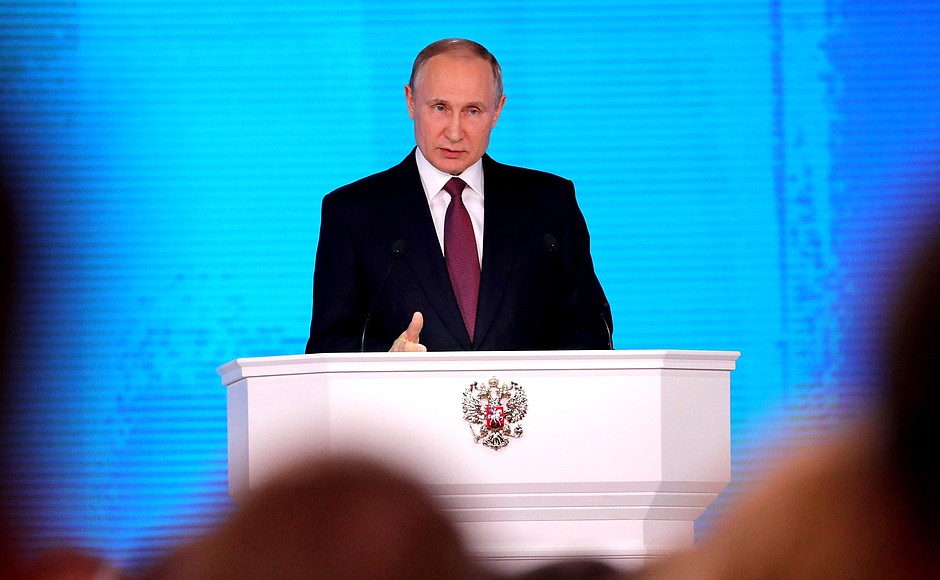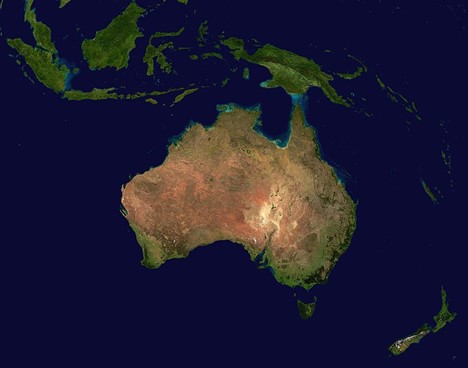By Jean Cocco, March 7, 2018
Putin claims Russia has developed “invincible missile” that can reach anywhere in the world, adding new fire to rocky U.S./Russia relations
“No one has listened to us. You will listen to us now.” This ominous phrase was voiced by President Vladimir Putin during his March 1, 2018 speech to the Russian Federal Assembly. In the speech, Putin stated that Russia has new strategic weapons to counter potential threats posed by the United States. In response, the White House said Putin confirmed what the U.S. has already known—that Russia has been violating its treaty obligations. This development is a reflection that the U.S. and Russia are “in a conflict,” according to former CIA deputy director Michael Morell. “There should be no doubt in anyone’s mind that after the invasion of Georgia, the invasion of Ukraine, the intervention in Syria, the meddling in our election, the attack last week by Russian mercenaries on U.S. forces in Syria, that we are again in a Cold War.”
On March 5th, the Michael V. Hayden Center for Intelligence, Policy, and International Security hosted Russia and the Cold War 2.0. The policy discussion was held at the George Mason University’s Arlington campus and featured a discussion between General Michael V. Hayden and former NATO Supreme Allied Commander, General Wesley K. Clark. The talk began with General Clark highlighting the need for the United States to have a clear strategy manage its relationship with Russia. He then voiced three observations about the current state of relations between the two great powers. One, the struggle between the two nations did not end with the Cold War. Two, recent events are not a replay of the Cold War. Three, the two nations are engaged in a continual geopolitical chess game. General Clark eloquently elaborated on each observation with anecdotes from his past experiences with Russia and provided analysis on why the Russian-U.S. relationship has soured.
In his first observation, General Clark spoke about the relationship being fraught with insecurities because of Russia’s sensitivity to the United States encroaching into their “part of Europe.” The General mentioned the significance of Kosovo as an example of that mentality. In his view, U.S. intervention in Kosovo in the 1990s was the result of the U.S. using force against Russian allies who share a Slavic heritage with the Serbs and was an opportunity to increase the enlargement of NATO. General Clark expressed his opinion focused that both Russia and her Balkan allies have never forgotten or forgave the U.S. military campaign in Kosovo. It was an attack on Russian identity and has shaped the Russian vantage point of seeing the globe as one massive geo-political chess game, particularly, against the United States.
In his second observation, General Clark strongly emphasized that the current interactions between the U.S. and Russians is not a replay of the old Cold War. Both countries are entangled through business and financial transactions, as well as through other means such as dual-citizenship. Furthermore, the ruble is now ubiquitous and convertible in the global economy compared to how it was in the past. Moreover, the Russians have successfully used their investments to buy influence and ensure reliance on its raw materials. Consequently, Europe is highly dependent on Russian natural gas for its energy needs. General Clark concluded that the old Soviet attitude is present but has more global influence and in Putin, a leader who is a risk-taker.
At the close of the talk, General Clark reiterated his view that U.S. and NATO policies toward Serbia and Kosovo, along with the extension of NATO membership to former Soviet Bloc countries caused Russia to “dig in its heels” against U.S. encroachment into Eastern Europe starting in the 1990s. General Clark and General Hayden agreed that Putin’s ultimate objective is to return to a traditional sphere of influence based on geo-strategic balance of power system where Russia and the United States are in a world of bi-polarity.
Jean Cocco if a first-year graduate student at George Mason University’s Schar School of Policy and Government. He holds a bachelor’s degree in Political Science and International Relations, as well as a French minor from the University of South Florida. His primary interests are energy, nuclear strategy, food/water security, terrorism, foreign policy, grand strategy, and geopolitics in Europe, the Middle East, and Asia.
The articles and other content which appear on the Center for Security Policy Studies website and social media posts are unofficial expressions of opinion. The views expressed are those of the authors, and do not reflect the positions of the Schar School of Policy and Government or of George Mason University.
The Center for Security Policy Studies does not screen articles to fit a particular editorial agenda, nor endorse or advocate material that is published. The Center for Security Policy Studies merely provides a forum for scholars and professionals to share perspectives and cultivate ideas. Comments on any digital outlet of the Center for Security Policy Studies will be moderated to ensure logical, professional, and courteous application to intellectual content.




